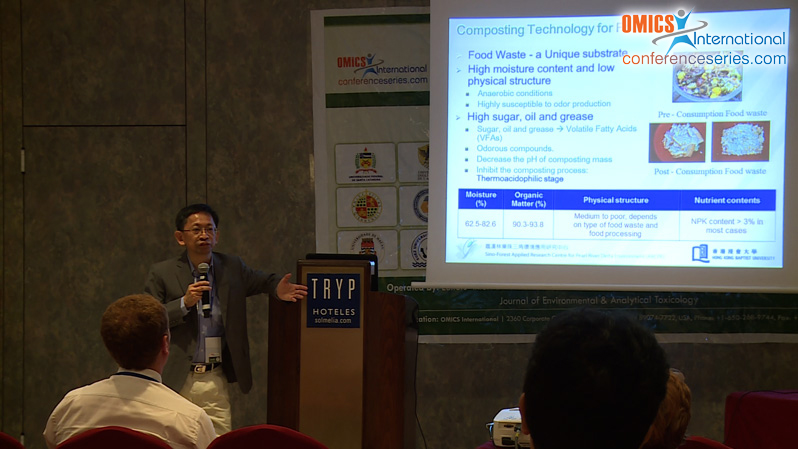
Jonathan W C Wong
Hong Kong Baptist University, China
Title: Decentralized composting for food waste management
Biography
Biography: Jonathan W C Wong
Abstract
Nearly one third representing about 1.3 billion tons/year of food produced for human consumption is lost or wasted globally and is mostly landfilled. This landfilled waste emits greenhouse gases, produces contaminated leachate and uses valuable land. Therefore, diverting the food waste for biological treatment such as composting would reduce the environmental impact and produce value added product. However, collecting the food waste from domestic sector is a challenge when the centralized-composting is targeted. In contrast, small-scale decentralized composting at the community level is a viable option to obtain the organic wastes of good quality suitable for composting. Food wastes are ideal substrates for composting as they can produce good quality compost due to the very little concern of contaminants. However, the composting process of food wastes is a bit complex than other organic wastes due to the generation of organic acids during the rapid degradation of easily available organic matter. Accumulation of organic acids acidifies the composting mass and cause failure and emission of acidic odour. In addition, significant quantities of protein and fat contents also create odour and operational problems, respectively. Addition of alkaline compounds are generally practiced to control the pH however, this practice results in ammonia emission and nitrogen loss from the composter resulting in the production of compost with low nutrient content affecting its marketing value. Emission of odour reduces the acceptance of composting as the treatment technology in urban settings. Another critical issue of these composters is that the fed-batch mode of feeding and the mixing affects the retention of composting mass in the reactor for sufficient period time that leads to production of immature compost requiring further curing. Therefore controlling the acidity and odour, reducing the nutrient loss and achieving a stable operation are the keys for the successful decentralized composting. Addition of lime at 2-4% is effective to neutralize the acids generated during food waste composting but the nitrogen loss was about 44% of the total nitrogen. Alternatively, addition of zeolite at 5-10% showed a similar effect and also reduced the nitrogen loss by 34% compared with lime. In addition, zeolite accelerated the composting reduced the salinity and odour. During the entire operation, the odour intensity was <2 D/T. Use of effective oil degrading bacterial consortium effectively improved the physical structure of the composting mass in the reactor that promoted rapid composting. Mature composts could be obtained within 4 weeks with the bacterial inoculation and alkaline addition. Furthermore, addition of inorganic salts to induce struvite formation was shown to reduce the nitrogen loss but controlling the salinity is the challenge. Thus, an integrated approach of inoculating effective microorganisms to breakdown the oil/lipid and alleviating the acidity and odour through alkaline/struvite agents is an effective approach. However, a balance must be maintained to achieve the desired results. This presentation will share the approaches to overcome the challenges and the success achieved with the community-level food waste composters.

